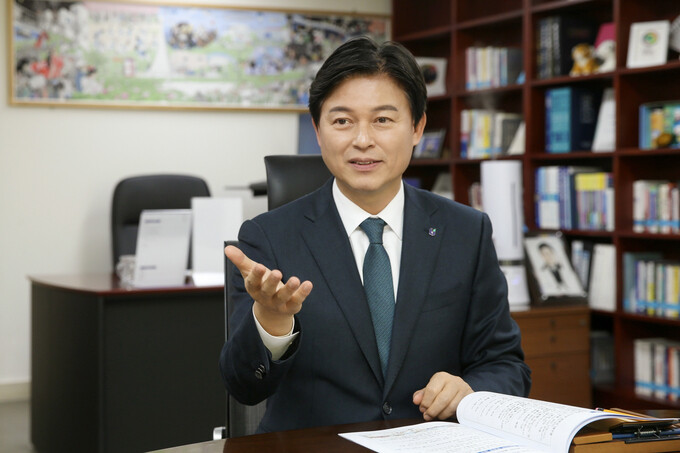
BUCHEON, South Korea – Bucheon City is rapidly solidifying its position as a hub for advanced technology, with a series of high-profile investments transforming its urban landscape. Major domestic and international enterprises, including Korean Air, SK Green Techno Campus, and DN Solutions, have committed to establishing operations within the Bucheon Daejang Urban High-Tech Industrial Complex, signaling the imminent realization of a thriving high-tech industrial ecosystem.
Bucheon's proactive "sales drive" under Mayor Jo Yong-ik aims to attract further investment in critical sectors such as aerospace, semiconductors, robotics, precision machinery, bio-health, and eco-friendly technologies. The city has actively promoted the strategic advantages and incentives of the Daejang complex at key industry events, including those hosted by the European Chamber of Commerce in Korea (ECCK), the Federation of Korean Industries (FKI), and the Korea Management Association (KMA). This concerted effort aligns with Bucheon's vision of creating a "work-live-play" (직주락) city, fostering a high quality of life with abundant job opportunities, residential options, and cultural amenities.
Landmark Investments Propel Bucheon's Industrial Ambitions
Bucheon has secured two significant investment deals this year alone, demonstrating its growing appeal to leading-edge companies. Last month, Korean Air signed an investment agreement to establish a comprehensive drone research institute, assembly plant, and flight training center within the Bucheon Daejang 2nd Urban High-Tech Industrial Complex. Slated for completion by 2030, this expansive 65,845 square meter (approximately 20,000 pyeong) facility will host over 1,000 master's and Ph.D.-level specialists and provide Asia's largest pilot training program for approximately 21,000 individuals annually. This strategic move by Korean Air underscores Bucheon's emergence as a key player in the burgeoning aerospace and drone industries.
In January, Bucheon forged a ₩240 billion (approximately $175 million USD) investment agreement with DN Solutions, a global top-three and Korea's leading manufacturer of lathes and machining centers. An advanced research and development (R&D) center is set to be constructed on a 14,334 square meter (approximately 4,300 pyeong) site within the Bucheon Daejang 1st Urban High-Tech Industrial Complex, with completion targeted for 2028. This investment will further bolster Bucheon's precision machinery sector and strengthen its position in advanced manufacturing.
Adding to these successes, SK Green Techno Campus committed in 2023 to establishing an eco-friendly energy R&D complex. This sprawling 137,000 square meter (approximately 40,000 pyeong) facility within the Bucheon Daejang 1st Urban High-Tech Industrial Complex will house key SK Group affiliates, including SK Innovation, and is expected to accommodate over 1,000 master's and Ph.D.-level personnel. This concentration of expertise is poised to make Bucheon a focal point for green technology innovation.
Bucheon City anticipates significant positive synergies from the co-location of these industry leaders in aerospace technology, precision machinery, and energy efficiency. This convergence is expected to foster technological convergence, enhance R&D collaboration, and cultivate robust cooperative networks. This environment will not merely be a shared location but is projected to catalyze the formation of new converged industrial ecosystems, positioning the Bucheon Daejang Urban High-Tech Industrial Complex as a pivotal engine for the development of next-generation industrial technology convergence.
International Outreach and Future Prospects
Mayor Jo Yong-ik's commitment to attracting investment extends to global outreach. On May 15th, Bucheon participated in the "All European Network Night 2025 (AENN 2025)" hosted by the European Chamber of Commerce in Korea (ECCK) at the Grand Hyatt Seoul hotel. The ECCK boasts over 350 member companies from 12 European countries, including the United Kingdom, Germany, and France.
The event, attended by over 200 participants including Mayor Jo, representatives from the EU Delegation to Korea, domestic and international institutions, corporations, and local government officials, served as a crucial platform for information exchange and networking. Notably, Bucheon was the first local government to set up a promotional booth at the event, showcasing promotional videos of the Daejang complex and conducting personalized one-on-one consultations with corporate representatives.
Business leaders at the event expressed considerable interest in the Bucheon Daejang Urban High-Tech Industrial Complex's exceptional transportation infrastructure, highlighting its proximity to international airports and its connectivity via the GTX-D·Y Branch·E lines, as well as the Daejang-Hongdae Line.
Mayor Jo personally engaged with key figures, including Philip van Hoof, President of the ECCK; Heikki Ranta, President of the Finnish Chamber of Commerce in Korea; and Moon-seop Choi, CEO of Miele Korea. He leveraged these discussions to directly convey the potential and investment appeal of Bucheon as a corporate city.
Bucheon's proactive investment attraction strategy involves direct engagement with business leaders. In March and April, the city participated in breakfast meetings hosted by the Federation of Korean Industries (FKI) and the Korea Management Association (KMA), where it showcased the strategic advantages and differentiated investment attraction strategies of the Bucheon Daejang Urban High-Tech Industrial Complex.
Looking ahead, Bucheon plans to participate in the Invest Korea Summit, a high-level national investor relations (IR) event, in the latter half of the year. This participation will allow the city to further extend its promotional activities to major foreign investors.
"Attracting excellent companies will lead to an increase in quality jobs, which in turn will draw more residents to Bucheon, revitalizing the local economy across various sectors including lodging, transportation, and commerce," stated Mayor Jo Yong-ik. "Leveraging our strengths as a transportation hub in the Seoul Metropolitan Area, we aim to build a self-sufficient city where people converge, live, and work in close proximity."
[Copyright (c) Global Economic Times. All Rights Reserved.]



























